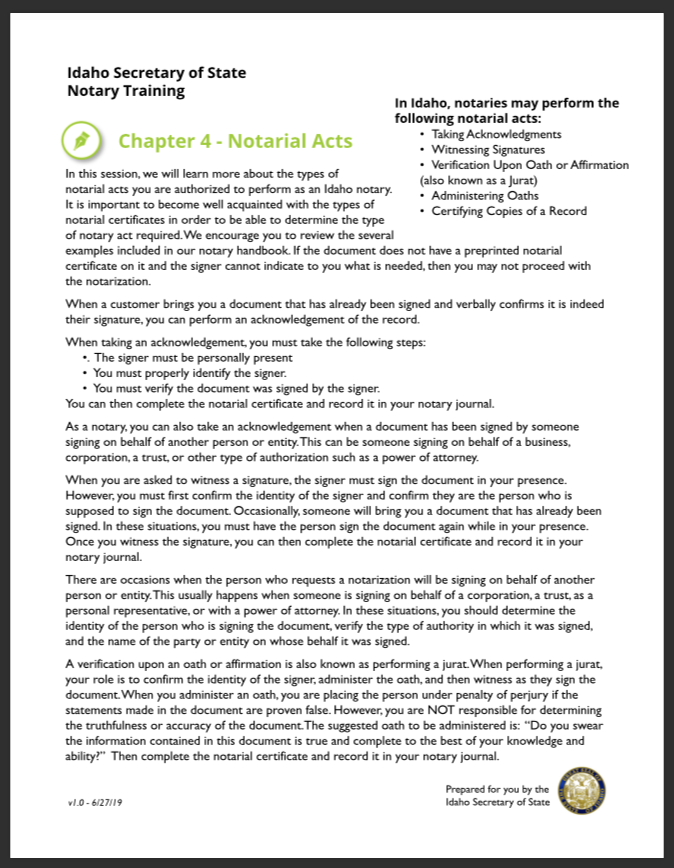Idaho Secretary of State
Notary Training
![]()
Training Video
Training Transcript
 Chapter 4 – Notarial Acts
Chapter 4 – Notarial Acts
In this session, we will learn more about the types of notarial acts you are authorized to perform as an Idaho notary. It is important to become well acquainted with the types of notarial certificates in order to be able to determine the type of notary act required. We encourage you to review the several examples included in our notary handbook. If the document does not have a preprinted notarial certificate on it and the signer cannot indicate to you what is needed, then you may not proceed with the notarization.
When a customer brings you a document that has already been signed and verbally confirms it is indeed their signature, you can perform an acknowledgement of the record.
When taking an acknowledgement, you must take the following steps:
-
-
-
-
-
-
-
-
-
-
-
-
-
-
-
- The signer must be personally present
-
-
-
-
-
-
-
-
-
-
-
-
-
-
-
-
-
-
-
-
-
-
-
-
-
-
-
-
-
- You must properly identify the signer.
-
-
-
-
-
-
-
-
-
-
-
-
-
-
-
-
-
-
-
-
-
-
-
-
-
-
-
-
-
- You must verify the document was signed by the signer.
-
-
-
-
-
-
-
-
-
-
-
-
-
-
You can then complete the notarial certificate and record it in your notary journal.
As a notary, you can also take an acknowledgement when a document has been signed by someone signing on behalf of another person or entity. This can be someone signing on behalf of a business, corporation, a trust, or other type of authorization such as a power of attorney.
When you are asked to witness a signature, the signer must sign the document in your presence. However, you must first confirm the identity of the signer and confirm they are the person who is supposed to sign the document. Occasionally, someone will bring you a document that has already been signed. In these situations, you must have the person sign the document again while in your presence. Once you witness the signature, you can then complete the notarial certificate and record it in your notary journal.
There are occasions when the person who requests a notarization will be signing on behalf of another person or entity. This usually happens when someone is signing on behalf of a corporation, a trust, as a personal representative, or with a power of attorney. In these situations, you should determine the identity of the person who is signing the document, verify the type of authority in which it was signed, and the name of the party or entity on whose behalf it was signed.
A verification upon an oath or affirmation is also known as performing a jurat. When performing a jurat, your role is to confirm the identity of the signer, administer the oath, and then witness as they sign the document. When you administer an oath, you are placing the person under penalty of perjury if the statements made in the document are proven false. However, you are NOT responsible for determining the truthfulness or accuracy of the document. The suggested oath to be administered is: “Do you swear the information contained in this document is true and complete to the best of your knowledge and ability?” Then complete the notarial certificate and record it in your notary journal.
While a personal appearance before the notary is typically required, certifying copies is the exception to the rule. No physical presence is required when certifying a copy of a document, nor are you required to identify anyone in conjunction with this notarial act.
Before you certify a copy, you must first:
-
-
-
-
-
-
-
-
-
-
-
-
-
-
-
- Examine the original document to make sure it is complete and unaltered.
-
-
-
-
-
-
-
-
-
-
-
-
-
-
-
-
-
-
-
-
-
-
-
-
-
-
-
-
-
- Verify the document may lawfully be copied and certified.
-
-
-
-
-
-
-
-
-
-
-
-
-
-
You must personally photocopy the document and then you can complete the notarial certificate and record it in your notary journal.
So there you have it! The end of another chapter and time to see what you remember. Click on your chapter 4 quiz link, and we’ll see you at Chapter 5!
v1.0 – 6/27/19


